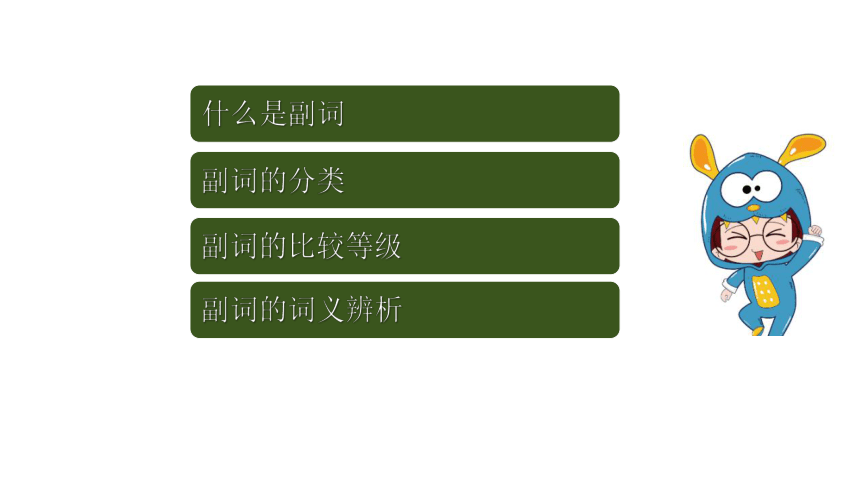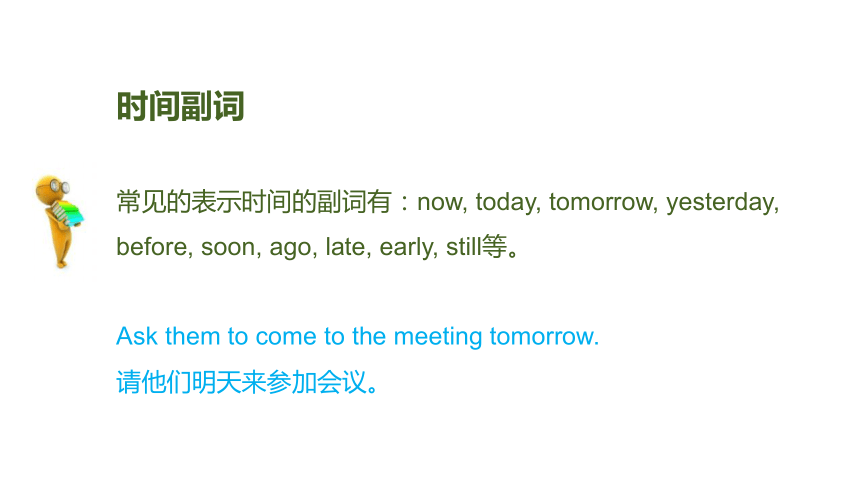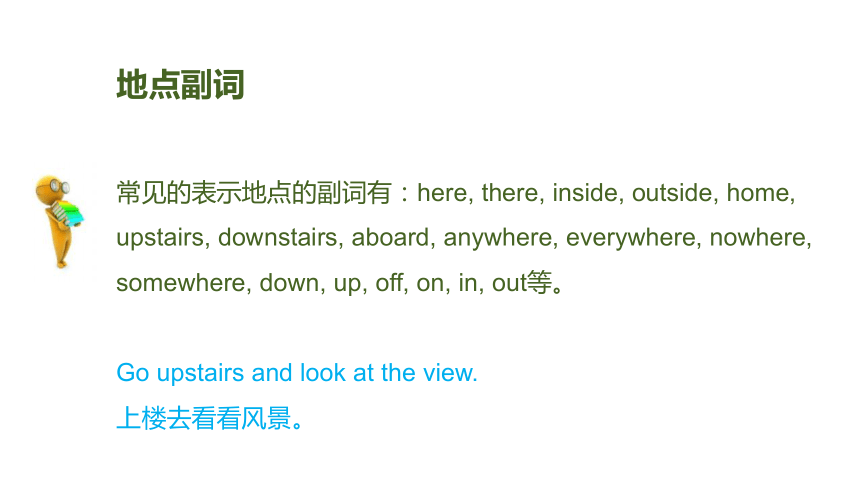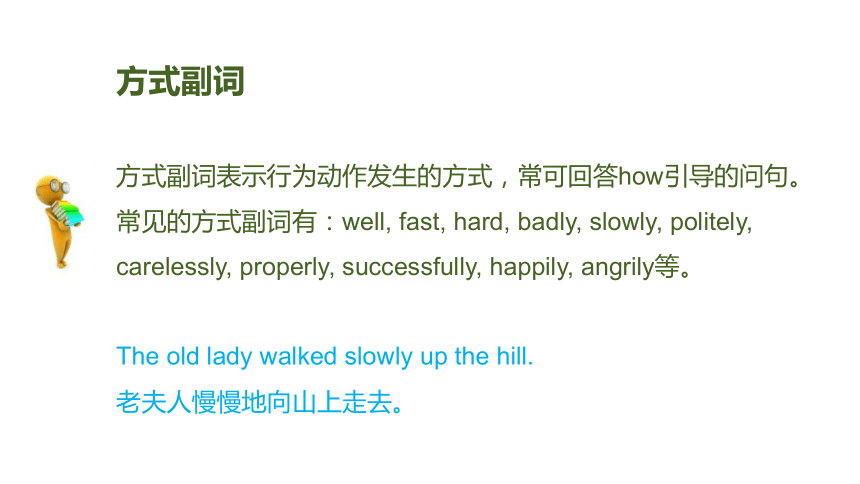专题五 副词——2024届中考英语一轮复习进阶课件(共40张PPT)【人教版】
文档属性
| 名称 | 专题五 副词——2024届中考英语一轮复习进阶课件(共40张PPT)【人教版】 |  | |
| 格式 | pptx | ||
| 文件大小 | 2.8MB | ||
| 资源类型 | 教案 | ||
| 版本资源 | 人教新目标(Go for it)版 | ||
| 科目 | 英语 | ||
| 更新时间 | 2023-12-14 08:12:08 | ||
图片预览












文档简介
(共40张PPT)
2024届中考英语一轮复习进阶讲义【人教部编版】
专题五 副词
考情分析
知识讲解
典例剖析
考情分析
每年中考题除了在阅读、听力等题型中间接考查副词以外,也会通过单项选择和完型填空题直接考查副词的用法。纵观和分析近几年考生在此部分的答题和出现问题的情况,关键在于帮助考生明确副词的基本意义以及在语句中的功能和位置,如副词用来修饰形容词、动词、其它副词或者句子,一般位于动词之后、形容词之前或者句子之首。
知识讲解
什么是副词
副词(Adverb 简称adv.)是指在句子中表示行为或状态特征的词,用以修饰动词、形容词、其他副词或全句,表示时间、地点、程度、方式等概念。
副词的分类
时间副词
常见的表示时间的副词有:now, today, tomorrow, yesterday, before, soon, ago, late, early, still等。
Ask them to come to the meeting tomorrow.
请他们明天来参加会议。
地点副词
常见的表示地点的副词有:here, there, inside, outside, home, upstairs, downstairs, aboard, anywhere, everywhere, nowhere, somewhere, down, up, off, on, in, out等。
Go upstairs and look at the view.
上楼去看看风景。
方式副词
方式副词表示行为动作发生的方式,常可回答how引导的问句。常见的方式副词有:well, fast, hard, badly, slowly, politely, carelessly, properly, successfully, happily, angrily等。
The old lady walked slowly up the hill.
老夫人慢慢地向山上走去。
程度副词
程度副词多用来修饰形容词和副词,有少数用来修饰动词或介词短语。常见的程度副词有:much, (a) little, a bit, very, so, too, enough, quite, rather, pretty, greatly, completely, nearly, almost, deeply, hardly等。
Your work is pretty good, but you could be better.
你的工作做得很不错,但是还可以更好些。
频度副词
常用的频度副词有:always, often, usually, sometimes, seldom, ever, never等。
We sometimes visit our grandmother.
我们有时去看望我们的祖母。
疑问副词
疑问副词是用来引导特殊疑问句的副词。常见的疑问副词有:how, when, where, why等。
How are you getting along with your studies
你的学习进展怎么样?
关系副词
关系副词有:how, when, why, where等,他们的词形都和疑问副词一样,但都引导从句或与不定式连用。
Thomas wants to know where Nina lives.
托马斯想知道妮娜住在哪里。
副词的比较等级
构成
副词和形容词一样,也有它的比较级和最高级形式,并且变化规则也是一样的。
单音节副词的比较级是在副词后面加上-er构成的,最高级是在副词后面加上-est构成的。例如:near nearer nearest; 多音节副词(多以-ly结尾)的比较级是在副词的前面加上-more构成的。最高级是在副词前面加上-most构成的。
例如:warmly, more warmly, most warmly有些副词的比较级和最高级形式是不规则的:
well-better-best little-less-least much-more-most
badly-worse-worst far-farther (further)-farthest(furthest)
原级的用法
① 用在句式“as+副词原级+as”中。
She works as carefully as her sister.
她和她姐姐一样工作认真。
② 句式not as(so)…as表示“一方不如另一方”。
I don't run as(so) fast as you.
我不如你跑得快。
比较级的用法
① 比较级用于两者之间进行比较,多用于than引导的从句中。
Trains run fast than cars. 火车比汽车跑得快。
② 比较级前可以用much, even, still, far, a bit, a little, a lot等词加以修饰。
Linda jumps much farther than you. 琳达跳得比你远多了。
比较级的用法
③ “比较级+and+比较级”表示“越来越……”。
The plane flew faster and faster. 飞机飞得越来越快了。
④ “the+比较级……, the+比较级……”表示“越……,就越……”。
The more we know each other, the better we understand each other.
我们彼此了解得越多,就越能互相理解。
最高级的用法
最高级用于三者或三者以上的人或物进行比较,副词最高级前面的the可省可不省,并且在句尾往往加上介词in或of短语。
Jack studies (the) hardest in his class.
杰克在他班上学习最努力。
副词的词义辨析
1. how long, how soon, how often与how far
(1) how long意为“多久,多长(时间)”,既可对物体长度提问,又可对一个持续的时间段提问,常用“for+时间段”和“since+时间点”回答。
- How long have you been in China 你在中国有多久了?
- For three months. 有三个月了。
(2) how soon意为“多快,多久”,对一个短暂性动作提问、用于一般将来时的句子中,常用“in十时间段”回答。
- How soon will he come back 他多久才能回来
- In five minutes.五分钟后。
(3) how often意为“多长时间一次”,对频率提问,常用once/twice/three times a week等回答。
- How often do you visit your grandparents 你多久去看望你的(外)祖父母一次?
- Once a week.一周一次。
(4) how far 意为“多远”,对距离提问。
- How far is it from your home to your school 你家离学校有多远
- About two kilometers. 大概两千米。
2. hard 与hardly
(1) hard意为“努力地;辛苦地;剧烈地;猛烈地”,是程度副词。
We should study hard. 我们应该努力学习。
(2) hardly意为“几乎不”,是否定副词。
I can hardly catch up with you. Can you walk slowly
我几乎赶不上你了,你能走慢一点吗?
3. too, as well, also 与either
too, as well, also与either都表示“也”。
(1) too和as well多用于口语,一般放在肯定句句末,too前一般用逗号隔开;
(2) also多用于书面语,一般放在肯定句句中与动词连用;
(3) either 用于否定句句末。
4. ago 与before
(1) ago为副词。它立足于现在,表示“从现在起若干时间之前”,通常与一般过去时连用,不能与完成时连用,也不能单独使用,必须与一段时间连用。
Two years ago, I was a primary school student.两年前我是一名小学生。
(2) before可作副词,单独用,可以用于现在完成时。作连词时,可以引导一个过去时的从句,主句用过去完成时,表示在过去某个动作之前就已经完成的动作。
Has she visited China before 以前她访问过中国吗
5. too much, too many与much too
(1) too much意为“太多”,用作形容词词组,修饰不可数名词;
Too much snow can cause trouble. 雪太多会引起麻烦。
(2) too many意为“太多”,修饰可数名词复数;
(3) much too 意为“太,非常”,用作副词词组,修饰形容词,副词。
These shoes are much to big for me. 这双鞋子对我来说太大了。
6. already与yet
(1) already 一般用于肯定句,常与完成时连用;有时也可用于疑问句中,表示惊奇。
Japanese companies have already made robots walk and dance.
日本公司已经制造出能走路和跳舞的机器人了。
(2) yet意为“已经,还,尚”,一般用于否定句和疑问句中,常位于主要动词前或句末。
But I haven't locked the garage yet. 但我还没有锁车库。
典例剖析
1.We need to learn how to be ________ when asking for help. It seems more difficult to speak ________ than directly.
polite; politely B. politely; polite
C. politely; politely D. polite; polite
答案:A
解析:我们需要学会在寻求帮助时如何礼貌。礼貌地说话似乎比直接说话更难。考查形容词副词用法。polite礼貌的:politely礼貌地。第一个空后接形容词,表示“如何变得有礼貌”,be动词后接形容词,此空使用polite;第二空修饰动词speak,副词修饰动词,故填politely。故选A。
2.—Our class did well in the school singing competition.
—Yes, you sang _____ of all.
A. beautifully B. more beautifully C. most beautifully
2.答案:C
解析:本题考查副词的比较等级。根据设空后的"of all"可知, 设空处应用副词的最高级形式, 故选C。
3.Computers can work out the difficult problems________than human beings.
A.much quickly B.more quick
C. far more quickly D.very quickly
3.答案:C
解析:由than可知用比较级;修饰动词词组work out作状语,要用副词。故选C。
4.Lily is ______ with her lessons and she does her homework _____ every day.
A. careful; carefully B. careful; careful
C. carefully; careful D. carefully; carefully
4.答案:A
解析:句意:莉莉上课很认真,她每天都认真做作业。考查形容词和副词的用法。careful认真的,形容词;carefully认真地,副词。根据第一个空前的“is”可知第一个空应该用形容词作表语,排除C和D;由第二个空前的“does her homework”可知第二个空应该用副词修饰动词,排除B,故选A。
5.My sister works so hard that she________makes few mistakes in her homework.
A.never B.seldom C.usually D.hardly
5.答案:C
解析:句意:我妹妹学习很努力,以至于她作业通常很少出错。考查副词。never从不; seldom很少;usually通常; hardly几乎不。根据My sister works so hard可知,我妹妹学习很努力,因此她的作业经常很少出错,故选C。
6.The question is not too difficult, and I can work it out ________.
A. easy B. easily C. hard D. carefully
6.答案:B
解析:句意:这个问题不太难,我可以很容易地解决。考查副词辨析。easy容易的,形容词:easily容易地,副词:hard努力地,副词:carefully仔细地,副词。根据“The question is not too difficult”可知,容易解出来。此处副词修饰动词短语“work it out”.故选B。
7.People should ________ pick up the rubbish whenever they see it.
A.never B.seldom C.sometimes D.always
7.答案:D
解析:句意:每当人们看到垃圾,应该总是捡起它。考查频度副词。never从不; seldom 很少; sometimes有时; always总是。根据People should...pick up the rubbish whenever they see it及常识可知,看到垃圾应该捡起,保护环境人人有责,故选D。
8.—You have made great progress on your study.
—Thank you. I believe ________ you work, the better grades you will get.
A.the more careful B.the worse C.the harder
8.答案:C
解析:句意:你的学习有了很大的进步。谢谢。我相信你越努力,你的成绩就越好。考查副词辨析。more careful更仔细的,形容词比较级;worse更糟地,副词比较级; harder更努力地,副词比较级。此处修饰动词work应用副词形式;根据the better grades you will get可知,成绩越好说明越努力。故选C。
THANKS
2024届中考英语一轮复习进阶讲义【人教部编版】
专题五 副词
考情分析
知识讲解
典例剖析
考情分析
每年中考题除了在阅读、听力等题型中间接考查副词以外,也会通过单项选择和完型填空题直接考查副词的用法。纵观和分析近几年考生在此部分的答题和出现问题的情况,关键在于帮助考生明确副词的基本意义以及在语句中的功能和位置,如副词用来修饰形容词、动词、其它副词或者句子,一般位于动词之后、形容词之前或者句子之首。
知识讲解
什么是副词
副词(Adverb 简称adv.)是指在句子中表示行为或状态特征的词,用以修饰动词、形容词、其他副词或全句,表示时间、地点、程度、方式等概念。
副词的分类
时间副词
常见的表示时间的副词有:now, today, tomorrow, yesterday, before, soon, ago, late, early, still等。
Ask them to come to the meeting tomorrow.
请他们明天来参加会议。
地点副词
常见的表示地点的副词有:here, there, inside, outside, home, upstairs, downstairs, aboard, anywhere, everywhere, nowhere, somewhere, down, up, off, on, in, out等。
Go upstairs and look at the view.
上楼去看看风景。
方式副词
方式副词表示行为动作发生的方式,常可回答how引导的问句。常见的方式副词有:well, fast, hard, badly, slowly, politely, carelessly, properly, successfully, happily, angrily等。
The old lady walked slowly up the hill.
老夫人慢慢地向山上走去。
程度副词
程度副词多用来修饰形容词和副词,有少数用来修饰动词或介词短语。常见的程度副词有:much, (a) little, a bit, very, so, too, enough, quite, rather, pretty, greatly, completely, nearly, almost, deeply, hardly等。
Your work is pretty good, but you could be better.
你的工作做得很不错,但是还可以更好些。
频度副词
常用的频度副词有:always, often, usually, sometimes, seldom, ever, never等。
We sometimes visit our grandmother.
我们有时去看望我们的祖母。
疑问副词
疑问副词是用来引导特殊疑问句的副词。常见的疑问副词有:how, when, where, why等。
How are you getting along with your studies
你的学习进展怎么样?
关系副词
关系副词有:how, when, why, where等,他们的词形都和疑问副词一样,但都引导从句或与不定式连用。
Thomas wants to know where Nina lives.
托马斯想知道妮娜住在哪里。
副词的比较等级
构成
副词和形容词一样,也有它的比较级和最高级形式,并且变化规则也是一样的。
单音节副词的比较级是在副词后面加上-er构成的,最高级是在副词后面加上-est构成的。例如:near nearer nearest; 多音节副词(多以-ly结尾)的比较级是在副词的前面加上-more构成的。最高级是在副词前面加上-most构成的。
例如:warmly, more warmly, most warmly有些副词的比较级和最高级形式是不规则的:
well-better-best little-less-least much-more-most
badly-worse-worst far-farther (further)-farthest(furthest)
原级的用法
① 用在句式“as+副词原级+as”中。
She works as carefully as her sister.
她和她姐姐一样工作认真。
② 句式not as(so)…as表示“一方不如另一方”。
I don't run as(so) fast as you.
我不如你跑得快。
比较级的用法
① 比较级用于两者之间进行比较,多用于than引导的从句中。
Trains run fast than cars. 火车比汽车跑得快。
② 比较级前可以用much, even, still, far, a bit, a little, a lot等词加以修饰。
Linda jumps much farther than you. 琳达跳得比你远多了。
比较级的用法
③ “比较级+and+比较级”表示“越来越……”。
The plane flew faster and faster. 飞机飞得越来越快了。
④ “the+比较级……, the+比较级……”表示“越……,就越……”。
The more we know each other, the better we understand each other.
我们彼此了解得越多,就越能互相理解。
最高级的用法
最高级用于三者或三者以上的人或物进行比较,副词最高级前面的the可省可不省,并且在句尾往往加上介词in或of短语。
Jack studies (the) hardest in his class.
杰克在他班上学习最努力。
副词的词义辨析
1. how long, how soon, how often与how far
(1) how long意为“多久,多长(时间)”,既可对物体长度提问,又可对一个持续的时间段提问,常用“for+时间段”和“since+时间点”回答。
- How long have you been in China 你在中国有多久了?
- For three months. 有三个月了。
(2) how soon意为“多快,多久”,对一个短暂性动作提问、用于一般将来时的句子中,常用“in十时间段”回答。
- How soon will he come back 他多久才能回来
- In five minutes.五分钟后。
(3) how often意为“多长时间一次”,对频率提问,常用once/twice/three times a week等回答。
- How often do you visit your grandparents 你多久去看望你的(外)祖父母一次?
- Once a week.一周一次。
(4) how far 意为“多远”,对距离提问。
- How far is it from your home to your school 你家离学校有多远
- About two kilometers. 大概两千米。
2. hard 与hardly
(1) hard意为“努力地;辛苦地;剧烈地;猛烈地”,是程度副词。
We should study hard. 我们应该努力学习。
(2) hardly意为“几乎不”,是否定副词。
I can hardly catch up with you. Can you walk slowly
我几乎赶不上你了,你能走慢一点吗?
3. too, as well, also 与either
too, as well, also与either都表示“也”。
(1) too和as well多用于口语,一般放在肯定句句末,too前一般用逗号隔开;
(2) also多用于书面语,一般放在肯定句句中与动词连用;
(3) either 用于否定句句末。
4. ago 与before
(1) ago为副词。它立足于现在,表示“从现在起若干时间之前”,通常与一般过去时连用,不能与完成时连用,也不能单独使用,必须与一段时间连用。
Two years ago, I was a primary school student.两年前我是一名小学生。
(2) before可作副词,单独用,可以用于现在完成时。作连词时,可以引导一个过去时的从句,主句用过去完成时,表示在过去某个动作之前就已经完成的动作。
Has she visited China before 以前她访问过中国吗
5. too much, too many与much too
(1) too much意为“太多”,用作形容词词组,修饰不可数名词;
Too much snow can cause trouble. 雪太多会引起麻烦。
(2) too many意为“太多”,修饰可数名词复数;
(3) much too 意为“太,非常”,用作副词词组,修饰形容词,副词。
These shoes are much to big for me. 这双鞋子对我来说太大了。
6. already与yet
(1) already 一般用于肯定句,常与完成时连用;有时也可用于疑问句中,表示惊奇。
Japanese companies have already made robots walk and dance.
日本公司已经制造出能走路和跳舞的机器人了。
(2) yet意为“已经,还,尚”,一般用于否定句和疑问句中,常位于主要动词前或句末。
But I haven't locked the garage yet. 但我还没有锁车库。
典例剖析
1.We need to learn how to be ________ when asking for help. It seems more difficult to speak ________ than directly.
polite; politely B. politely; polite
C. politely; politely D. polite; polite
答案:A
解析:我们需要学会在寻求帮助时如何礼貌。礼貌地说话似乎比直接说话更难。考查形容词副词用法。polite礼貌的:politely礼貌地。第一个空后接形容词,表示“如何变得有礼貌”,be动词后接形容词,此空使用polite;第二空修饰动词speak,副词修饰动词,故填politely。故选A。
2.—Our class did well in the school singing competition.
—Yes, you sang _____ of all.
A. beautifully B. more beautifully C. most beautifully
2.答案:C
解析:本题考查副词的比较等级。根据设空后的"of all"可知, 设空处应用副词的最高级形式, 故选C。
3.Computers can work out the difficult problems________than human beings.
A.much quickly B.more quick
C. far more quickly D.very quickly
3.答案:C
解析:由than可知用比较级;修饰动词词组work out作状语,要用副词。故选C。
4.Lily is ______ with her lessons and she does her homework _____ every day.
A. careful; carefully B. careful; careful
C. carefully; careful D. carefully; carefully
4.答案:A
解析:句意:莉莉上课很认真,她每天都认真做作业。考查形容词和副词的用法。careful认真的,形容词;carefully认真地,副词。根据第一个空前的“is”可知第一个空应该用形容词作表语,排除C和D;由第二个空前的“does her homework”可知第二个空应该用副词修饰动词,排除B,故选A。
5.My sister works so hard that she________makes few mistakes in her homework.
A.never B.seldom C.usually D.hardly
5.答案:C
解析:句意:我妹妹学习很努力,以至于她作业通常很少出错。考查副词。never从不; seldom很少;usually通常; hardly几乎不。根据My sister works so hard可知,我妹妹学习很努力,因此她的作业经常很少出错,故选C。
6.The question is not too difficult, and I can work it out ________.
A. easy B. easily C. hard D. carefully
6.答案:B
解析:句意:这个问题不太难,我可以很容易地解决。考查副词辨析。easy容易的,形容词:easily容易地,副词:hard努力地,副词:carefully仔细地,副词。根据“The question is not too difficult”可知,容易解出来。此处副词修饰动词短语“work it out”.故选B。
7.People should ________ pick up the rubbish whenever they see it.
A.never B.seldom C.sometimes D.always
7.答案:D
解析:句意:每当人们看到垃圾,应该总是捡起它。考查频度副词。never从不; seldom 很少; sometimes有时; always总是。根据People should...pick up the rubbish whenever they see it及常识可知,看到垃圾应该捡起,保护环境人人有责,故选D。
8.—You have made great progress on your study.
—Thank you. I believe ________ you work, the better grades you will get.
A.the more careful B.the worse C.the harder
8.答案:C
解析:句意:你的学习有了很大的进步。谢谢。我相信你越努力,你的成绩就越好。考查副词辨析。more careful更仔细的,形容词比较级;worse更糟地,副词比较级; harder更努力地,副词比较级。此处修饰动词work应用副词形式;根据the better grades you will get可知,成绩越好说明越努力。故选C。
THANKS
同课章节目录
- 词法
- 名词
- 动词和动词短语
- 动词语态
- 动词时态
- 助动词和情态动词
- 非谓语动词
- 冠词
- 代词
- 数词和量词
- 形容词副词及其比较等级
- 介词和介词短语
- 连词和感叹词
- 构词法
- 相似、相近词比较
- 句法
- 陈述句
- 一般疑问句和否定疑问句
- 特殊疑问句及选择疑问句
- 反意疑问句
- 存在句(There be句型)
- 宾语从句
- 定语从句
- 状语从句
- 主谓一致问题
- 简单句
- 并列句
- 复合句
- 主谓一致
- 主、表语从句
- 名词性从句
- 直接引语和间接引语
- 虚拟语气
- 感叹句
- 强调句
- 倒装句
- 祈使句
- 句子的成分
- 句子的分类
- 题型专区
- 单项选择部分
- 易错题
- 完形填空
- 阅读理解
- 词汇练习
- 听说训练
- 句型转换
- 补全对话
- 短文改错
- 翻译
- 书面表达
- 任务型阅读
- 语法填空
- 其他资料
